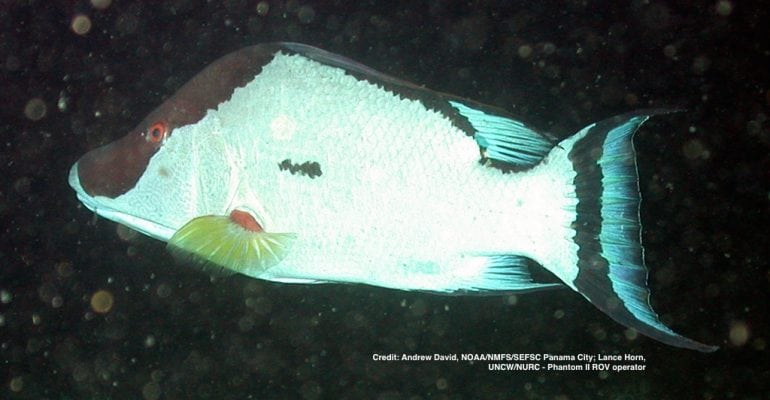KEY MESSAGE:
NOAA Fisheries announces a final rule for hogfish in the Gulf of Mexico (Gulf). Hogfish in the Gulf of Mexico will be managed as a single population from the Texas/Mexico border to a line near Cape Sable, Florida A recent population assessment determined that the Gulf hogfish population is not undergoing overfishing (rate of removal is too high) and is not overfished (population abundance is too low). This rule adjusts annual catch limits, establishes gear restrictions, and increases the minimum size limit for Gulf of Mexico hogfish to prevent overfishing.
WHEN RULE WILL TAKE EFFECT:
- Regulations will be effective August 24, 2017.
WHAT THIS MEANS:
This rule:
- Revises the Gulf hogfish fishery management unit to be the West Florida population, which includes all hogfish found in the Gulf of Mexico federal waters, except in the waters south of a line extending due west from 25°09′ North latitude off the west coast of Florida.
- Sets the West Florida population annual catch limits at 219,000 pounds whole weight (ww) for 2017 and 2018, and 159,300 pounds ww for 2019 and subsequent years.
- Increases the hogfish minimum size limit from 12 to 14 inches fork length.
- Prohibits the use of powerheads (a type of spearfishing device) for harvest of hogfish in the Gulf stressed area; an area previously defined by the Gulf of Mexico Fishery Management Council (Gulf Council).
- Corrects a charter vessel definition to be consistent with a headboat definition.
FORMAL FEDERAL REGISTER NAME/NUMBER:
82 FR 34574, published July 25, 2017.
This bulletin serves as a Small Entity Compliance Guide, complying with section 212 of the Small Business Regulatory Enforcement Fairness Act of 1996.
FREQUENTLY ASKED QUESTIONS (FAQs)
Why do the regulations need to be changed?
- The most recent hogfish population assessment divided the hogfish population into three populations based upon genetic analysis.
- The three populations and their status are:
◦ The West Florida population, which includes most of the Gulf of Mexico except for the Florida Keys, is not overfished or undergoing overfishing.
◦ The Florida Keys/East Florida population, which includes the Florida Keys and the east coast of Florida, is overfished and experiencing overfishing.
◦ The Georgia-North Carolina population’s overfishing and overfished status is unknown. - Because the Florida Keys/East Florida population is overfished and undergoing overfishing, a rebuilding plan is needed and overfishing needs to end immediately.
- The South Atlantic Fishery Management Council (South Atlantic Council) is taking the lead in rebuilding the Florida Keys/East Florida population because only a small portion of the Florida Keys/East Florida population extends into the Gulf Council’s jurisdiction in south Florida (Figure 1).
- The Gulf and South Atlantic Council created a jurisdictional management boundary between the West Florida and Florida Keys/East Florida populations, and the Gulf Council is revising hogfish regulations for the newly defined West Florida population.




